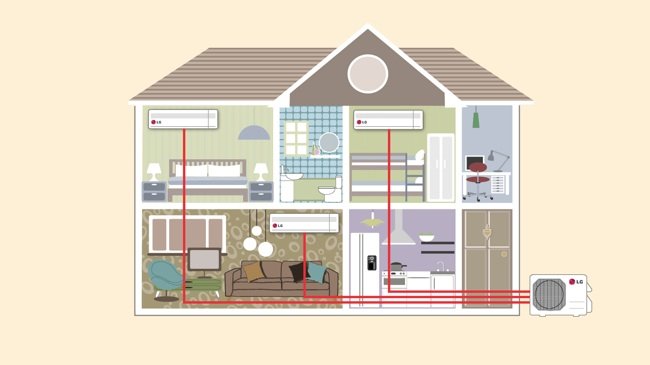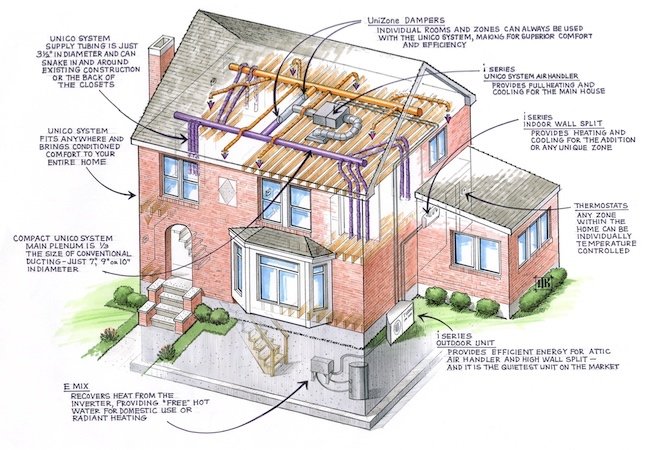We may earn revenue from the products available on this page and participate in affiliate programs. Learn More ›
High noon will turn many a classic home into a summertime sweatbox. And while noisy window-mounted air conditioners can lower temperatures, they are just as apt to spoil a charming exterior. Unfortunately, many old homes don’t have a convenient space to install ductwork for a traditional central air-conditioning system. Lowering ceilings or building out walls to hide supply and return ducts is expensive, and can blemish indoor spaces. Sometimes the attic or basement can hold the ductwork, but it’s still a shame to chop big chunks out of original plaster ceilings, wood floors, or wainscoting to place air registers.
Retrofit Systems
But don’t sweat it: There are air-conditioning systems that don’t need much bulky ductwork.
- Mini-split systems use individual cooling units placed room by room, which require only a thin refrigerant and power line connecting them to an outdoor air-conditioning compressor and fan.
- Another alternative, known as high-velocity HVAC systems, use two-inch insulated air-supply tubing to deliver chilled air. This tubing can be snaked through existing walls and ceilings in an old home to deliver cool air where it is needed. The registers are unobtrusive discs placed around the perimeter of the ceiling, or high on the walls.
All retrofitted air-conditioning systems will require some degree of creative cutting and patching in walls, floors, and ceilings.

Cost Considerations
While the new high-tech systems cost more than a regular duct system in new houses, they save money in old homes because of the reduced need for rough carpentry and subsequent finish work.
- An $8,000 to $10,000 price tag isn’t unusual for a high-velocity air-conditioning retrofit in an old house.
- Mini-splits offer an economical compromise: You can install cooling units in just one or two rooms, creating an oasis to retreat to during the dog days of summer.
Consult a professional installer to choose an air-conditioning compressor that will allow you to expand a partial system at a later date.

Sizing and Installation
A properly sized air-conditioning system is the most important factor for a comfortable home. Systems that are too big or small will lead to a host of complaints—it’s too loud, it breaks down too often, some rooms are too hot, some rooms are too cold, the electricity bills are too high.
A professional installer who will size the right is crucial to comfort. Make sure your installer shows you the industry-standard “Manual J” and “Manual D” sizing calculations for your house. If an installer wants to use rule-of-thumb sizing methods, find another contractor.
While there are a number of factors involved in choosing an air-conditioning system, keep in mind that bigger isn’t better. Oversized systems don’t dehumidify as well as systems that are properly matched to the needs of the house. This is critical to making the house feel cooler. Also, oversized systems cycle on and off more frequently, which means they wear out faster, break down more often, and cost more to maintain.
House Power
Before you install a new air conditioning system, consider your home’s electrical system. It is not uncommon for old houses to have only 110-volt, 60-amp service for the entire home—barely enough power to handle the home’s existing complement of lights and appliances. Central air conditioners require a dedicated 230-volt circuit and may require 20 to 50 amps of power, making an electrical service upgrade necessary. Have an electrician evaluate your home’s electrical supply before your HVAC contractor begins work.


